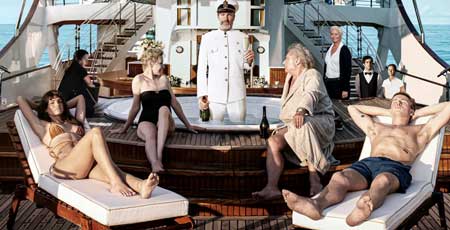Film (2022)
Written and directed by Ruben Östlund
With Thobias Thorwid (Lewis), Harris Dickinson (Carl), Charlbi Dean (Yaya), Amanda Walker (Clementine), Oliver Ford Davies (Winston) Vicki Berlin (Paula), Dolly De Leon (Abigail), Alicia Eriksson (Alicia), Woody Harrelson (The Captain), Zlatko Buric (Dimitry), Carolina Gynning Nilsson (Ludmilla), Henrik Dorsin (Jarmo), Sunnyi Melles (Vera), Iris Berben (Therese), Ralph Schicha (Uli), Arvin Kananian (Darius)
AMC Boston Common, Boston
Kendall Square Cinema, Cambridge, MA

Image: Courtesy of Neon
Reviewed by Tim Jackson
The films of Ruben Östlund, who began his career shooting reality and non-fiction, captures human behavior with a documentarian’s eye. His latest film, Triangle of Sadness is no exception. This dark satire on power and social relationships won the 2022 Palme d’Or at Cannes (he also won the award in 2017 for The Square). His patient observations do not always move toward plot conflict and resolution. Scenes are like small documentaries: the audience watches, listens and makes judgments. His early films blurred the line between fiction and non-fiction. Triangle has that quality at the start, then moves inevitably into the absurd and then into dark satire. He pulls out all the stops to Épater le Bourgeoisie, ripping off the masks of propriety and civilized behavior.
Triangle of Sadness’s barbed comedy unfolds in three acts. Chapter One, Carl and Yaya, is set in the world of fashion. The titular couple are both runway models. As the film opens, a room of half-dressed male models are instructed on to how to achieve a successful pose: look tough, desirable, and blank. This wickedly dry observational humor is Östlund’s specialty. Carl (Harris Dickinson), is set aside for a runway audition before a committee where he is instructed how to walk “naturally” and to relax his ‘triangle of sadness’ – the frown lines between the eyes. Then an audience gathers for a fashion show that projects the slogan Cynicism is Optimism. Finally, an extended scene between the titular couple Carl and Yaya (Charlbi Dean Kriek, who died sadly before the film was released) haggle endlessly over a dinner check. She tries to avoid his arguing by escaping into elevator. He keeps jamming open the door to make one more fatuous point on commitments, gender roles, and who makes more money: the petty problems of the young and beautiful. We have not yet begun to skewer.
Chapter Two, The Yacht, finds the couple sunning themselves on a luxury ocean cruise that will go spectacularly wrong. A customer service training talk by an enthusiastic director (Vicki Berlin) instructs the staff: the customer is always right, make sure their needs are met, and keep smiling. Diligence and order are essential; the high rolling clientele are rolling in new money. Carl and Yaya are on board with expenses paid. Their only responsibility is to snap glamour photos of the Yaya in a bikini. The rest of the guests are a grotesque assembly of supercilious nouveau riche. The Russian capitalist Dimitry (a fabulous Zlatko Burić) announces “I am in the business of shit.” He has a fertilizer empire. His pulchritudinous wife, Ludmila (Carolina Gynning Nilsson) sits at the ship’s bar with Yaya, where they field the awkward advances of Jorma Björkman (Henrik Dorsin) a wealthy socially awkward app coder. A gracious elderly couple, Clementine and Winston (Amanda Walker and Oliver Ford Davies) are proud manufacturers of weapons and hand grenades. Others in this menagerie maintain a façade of equality and fraternity, blind to their own bloated sense of privilege.
Food again becomes a motif. An extended scene of fine dining on the swaying boat gives way to sea sickness that will surely be the film’s most talked about scene. All hope for civility is washed away in rivers of vomit and excrement. Woody Harrelson pops up as the all-but-absent criminally laissez-faire Captain Thomas who dines and drinks casually while all around him goes to hell. No one is at this helm of his ship. Sloshed to the gills, Dimitry and Captain Thomas, an avowed Marxist, take over the ship’s public address system to read selections from Marx and Noam Chomsky. As the proceedings dissolve into chaos, the crew, mostly consisting of Latinos, struggle to clean up the ship. Things will get worse still.
For reasons I won’t divulge, survivors of the ship find themselves stranded on a beach in Chapter Three: The Island. Here one of Östland’s favorite themes of personal vs public responsibly plays out. Everyone’s status is leveled, and a new society must somehow adapt for survival. Abigail (a wonderful Dolly de Leon), who was a bathroom cleaner back on the ship turns out to be the only one who can catch a fish or start a fire. “What can any of you actually do?” she asks. Holding out a small morsel of fish, she continues: “Who am I?” Each castaway in turn responds to receive their pittance: “You are the Captain.” This is a new social contract, tradition has flipped upside down.
This rude, unlikely, and surreal tale is one more of Ruben Östlund’s tales on the superficiality of social hierarchy. The film trades in excess and absurdity but is kept alive by sharp casting. Known for his eccentric performances, Harrelson, whose role is an extended cameo, fits right in. There is a bit of Buñuel, a dash of John Waters, and a lot of Marx Brothers. The excess reminds me of Marco Ferreri’s 1973 satire La Grande Bouffe, in which three men (played by Marcello Mastroianni, Ugo Tognazzi and Michel Piccoli) stuff themselves literally to death with fine food. It is not enough for some filmmakers to make their point subtly. Even Winston Churchill once observed “If you have an important point to make, don’t try to be subtle or clever. Use a pile driver. Hit the point once. Then come back and hit it again. Then hit it a third time – a tremendous whack.” Here that whack is with a slapstick.
– Tim Jackson
Leave a Reply